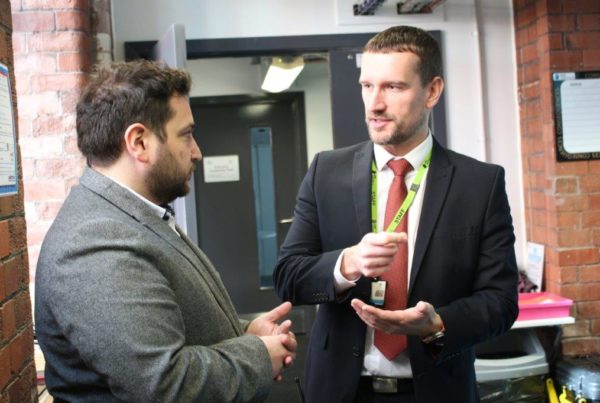We enjoy training new talent at Flywheel, and we regularly sponsor apprentices. We interviewed one of them to ask what the course was like, what he learned from working for us, and what advice he would give to anyone who wants to do an Infrastructure Technician Apprenticeship.
Alistair completed his Level 3 Infrastructure Technician Apprenticeship with us at the end of March 2022. This Infrastructure Technician course is designed to train IT support technicians. They should learn to deliver an efficient operation and maintain control of the IT infrastructure they are responsible for, either on-site or to end users. The support technician role is mainly desk based, resolving system user queries and resolving faults in a helpdesk environment. Alistair works on the Flywheel helpdesk to assist our customers with any support queries.
How Alistair got onto the Infrastructure Technician Apprenticeship Course
“I wanted to do the Infrastructure Technician Apprenticeship because I wanted to use the knowledge that I developed at Sixth Form College within a professional IT environment,” Alistair told us. “Although I was initially interested in the university pathway and looked around a few including Cardiff and Birmingham, I ended up deciding I wasn’t too keen on that pathway and that exploring apprenticeships would be a better decision for me personally.
“I applied and was one of a few that got accepted into a programme called the Worcestershire LEP Junior Internship Program at my sixth form. Loads of employers around my area participated and offered a mentor at the company. All first year STEM students could apply for this. I had a mentor from Worcester Bosch and so I was initially offered work experience there. There was a four-week placement planned, but I only spent one week there – the other three were cancelled because of the Covid pandemic. I enjoyed being in their office, where I explored their marketing department because I was particularly interested in web development at that point, and around the respective IT departments.”
Alistair previously did a Level 3 BTEC Extended Diploma in IT which he passed with D*D*D. However, as Alistair explains, people can still get accepted onto apprenticeships with lower grades and even just with GCSEs. Individual employers will set their own selection criteria, and they are likely to include five GCSEs (especially English, Mathematics and a STEM subject), or a relevant Level 2 Apprenticeship. You may also still be able to join the scheme with other relevant qualifications and experience, or even just an aptitude test with a focus on IT skills.
“
“I’m currently exploring which area of IT I may want to specialise in. Whatever I do, I love IT and my apprenticeship at Flywheel was a great way to get started in this career.”
What did the Infrastructure Technician Apprenticeship course and the job teach Alistair?
Alistair found that the coursework for his Infrastructure Technician Apprenticeship was similar in a lot of areas to the work he completed for his BTEC qualification. The overlapping areas which reinforced his knowledge were IT security, data, knowledge of computer systems.
“I honestly think I learnt more from the job than the apprenticeship,” comments Alistair. “The fact I was going back over areas I had already studied was helpful in quickly establishing myself within the company. I was out on site within the first three days of starting my apprenticeship with my mentor to replace a handful of computers at one of our customers’ sites.”
The new areas that Alistair learned on his Infrastructure Technician Apprenticeship were soft skills including communication, which taught him how to work efficiently as part of a team and working independently on tests whilst keeping colleagues aware and updated. He also learned everything relating to the work environment, ranging from WEEE regulations on recycling electrical equipment to health and safety regulations in the workplace.
“The hands-on experience of the job allowed me to learn a load of new areas within IT,” says Alistair. “One of these was Windows Server, which I had no prior experience beforehand. There’s a high barrier to entry to play around with this in a ‘homelab’ style environment as it comes with a steep price to use. To name just a few others, among the many, I learned about firewalls and enterprise networking including VLANs, packet inspection, access points, central management; I also learned Azure AD / AD, again, an enterprise Microsoft product, so I would never have got the chance to play around with this otherwise. I also had direct experience of rolling out MFA company-wide and using ticketing systems and remote management software of devices which, in our case, means Datto RMM.”
”
“I honestly think I learnt more from the job than the apprenticeship. I was out on site within the first three days of starting my apprenticeship with my mentor to replace a handful of computers at one of our customers’ sites.”
How was the Infrastructure Technician Apprenticeship structured?
For the Infrastructure Technician Apprenticeship, Alistair says that about 80% of his work was based on his e-portfolio that was submitted for assessment whilst roughly 20% consisted of online examinations, namely the BCS tests and an industry-specific certification. About 20% of Alistair’s working time at Flywheel was ringfenced for his apprenticeship studies.
The e-portfolio is the documentation of tasks and projects that are completed during the apprenticeship, which can be evidenced against the apprenticeship standard competencies. Apprentices create this during the allocated time for their apprenticeship studies.
Alistair comments: “The time doesn’t just have to be spent doing e-portfolio work, but can also be used to study for vendor certifications required by your employer which relate to the specification. If you’re in any doubt, any of the coaches will be happy to clarify.”
“
“By the time you finish your apprenticeship, you’re well prepared for the endpoint interview and to be honest, there’s nothing to be scared about. There’s also a session to prepare you for what is upcoming and regular mock interviews undertaken.”
The apprenticeship provider gave Alistair two mentors to support, coach and give reviews of his progress at monthly meetings. These alternated between his Professional Development Coach (PDC) to work on soft skills and a Skills and Knowledge Coach (SKC) with IT expertise. There were three-day workshops for each of the knowledge modules, which Alistair attended online. His five workshops included CompTIA A+ and Microsoft Mobility & Device Fundamentals. At the end of the week, there was a test.
Alistair also told us: “For the Infrastructure Technician Apprenticeship workshops, you have access to the content online and the coaches recommend you start to look at it beforehand to prepare yourself. Some of the tutors send work to start studying the content before the teaching lessons. During those sessions with the coach, I was given a mock test and, if I passed that, I could do an exam online which was rigorously monitored by an invigilator. Developing this ability to teach myself independently is essential to remain competitive in an IT career. Your knowledge needs to be updated constantly as it goes out of date so fast.”
“I passed all the tests. If you fail any of them, you must retake them at a later date, because you have to pass all of them to be allowed to progress and take the interview.
“At the end of the apprenticeship, your final assessment is around a two-hour video call interview with the examiner who questions you on your whole portfolio of coursework. The assessor would have also been given a detailed employer reference letter from your mentor at your work placement, reporting on your performance in each competency of the apprenticeship standard. You must be able to recall everything you have done in the past 18 months and answer quite probing questions.
“By the time you finish your Infrastructure Technician Apprenticeship, you’re well prepared for the endpoint interview and to be honest, there’s nothing to be scared about. There’s also a session to prepare you for what is upcoming and regular mock interviews undertaken. You can work with your mentor to suggest ideas about the reference, but your mentor must write this themselves and can show you. You must read through the reference before the interview. My advice to anyone embarking on an IT apprenticeship would be to take lots of notes, even if you hate taking notes! There’s so much you must recall, especially during the video-call interview at the end of the program”
What are Alistair’s future plans?
Alistair has been building his knowledge and hands-on experience at Flywheel and outside of work since completing his apprenticeship. He is still thinking about how he would like to advance his career in the future.
“I’m currently exploring which area of IT I may want to specialise in. Cyber security is very interesting career prospect and I think there is an exciting future ahead in this field. Whatever I do, I love IT and my apprenticeship at Flywheel was a great way to get started in this career.”






